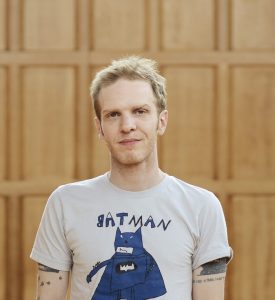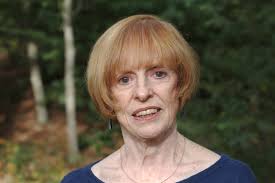Bob Proehl, Week One’s prose writer-in-residence, believes that sometimes the supernatural — magic, ghosts, aliens — may unlock the most emotionally honest elements of a story.

“Nobody wants to read a book that only makes safe choices,” he said.
In an apt beginning to a fresh season of Chautauqua Writers’ Center programming, Proehl, along with poet-in-residence Martha Collins, will host workshops to encourage imaginative approaches to creating. Both writers will give readings at 3:30 p.m. Sunday in the Hall of Philosophy.
Collins opens the morning workshop season with “Growing the Poem,” a series of sessions that helps participants develop and expand their own poems. The founder of the Creative Writing Program at University of Massachusetts Boston, Collins served as the Pauline Delaney Professor of Creative Writing at Oberlin College for a decade. She is also the author of Admit One: An American Scrapbook, Blue Front, and Night Unto Night.
Night Unto Night is the celebrated culmination of Collins’ own methodical process of “growing the poem.” A continuation of 2014’s Day Unto Day, the collection binds together the last six months of a writing endeavour that Collins mandated for herself: write several lines of poetry a day for one month, for 12 years.
Arriving on the grounds with a packet of poems “larger than we can discuss” in the workshop, Collins plans to lead with longer poems that contain multiple parts, ensuring that preference is given to the poems participants bring to the conversation. Among her selections is Wallace Stevens’ “Thirteen Ways of Looking at a Blackbird,” a prime example of a process Collins describes as “making a poem larger from within.”
“You may start with a small subject, but how do you add detail?” she said.

By introducing a new strategy and prompt each day, Collins hopes to inspire participants to thoroughly explore the potential of their ideas.
“I’m not going to tell them where to go in terms of content but instead how to use some strategies to push ahead and try something else,” she said.
Proehl, too, will teach techniques for authentic storytelling in his afternoon workshop. As the title “The Everyday Fantastic” suggests, Proehl uplifts the power of the otherworldly in pursuit of truth.
A 2012 New York Foundation for the Arts Fellow in Fiction and a 2013 resident at the Saltonstall Arts Colony, Proehl is the author of the coming-of-age road-trip narrative A Hundred Thousand Worlds, a novel which follows its young protagonist through comic book conventions brimming with superheroes and monsters. His forthcoming science-fiction novel The Nobody People finds a group of extraordinary individuals facing ordinary, malevolent bigotry to an uncertain end. Proehl’s reading will come from a self-contained chapter from The Nobody People wherein “the sci-fi concept is just starting to creep in from the periphery.”
Though his characters may confront the fantastical, Proehl prioritizes writing characters with authentic emotional lives, allowing readers to stay grounded in the book’s narrative even if robots or time travelers abound.
“You’re putting characters into extreme situations to see how they react, and that reaction has to be true to the person you’ve created on the page. … As far as striving for that, it’s a matter of not being overly precious with your characters, of letting them be wrong, be angry, be hurt,” Proehl said.
By excerpting readings from authors who “inject the strange,” Proehl hopes to impart both new tools to tell stories and “a sense of permission” to play “in the realm of ‘what if.’ ” Colson Whitehead’s Underground Railroad, for example, is one that Proehl, with more time, would require participants to read in its entirety.
“There’s still a perception that ‘high literature’ equals realistic portrayals of real things, or that ‘write what you know’ is a basic tenet of fiction,” Proehl said. “But there’s so much more to us than what happens to us. The space in our heads is far stranger than just what we experience.”
Whether they intend to experiment with form or genre, participants should approach both workshops with an open mind.
“You don’t know where (your writing is) going to take you,” Collins said. “But you know you aren’t going to stop.”
Collins and Proehl will offer a Brown Bag lecture at 12:15 p.m. Tuesday, June 23 and Friday, June 26 respectively, on the porch of the Literary Arts Center at Alumni Hall.




